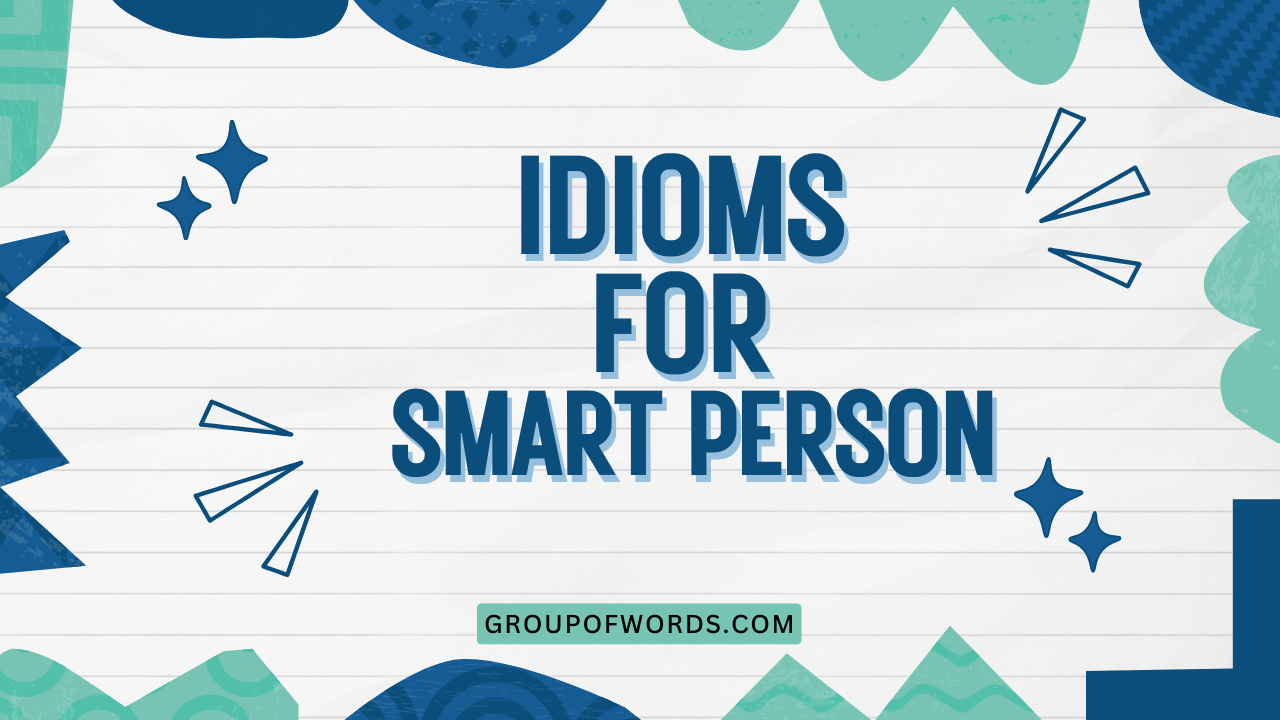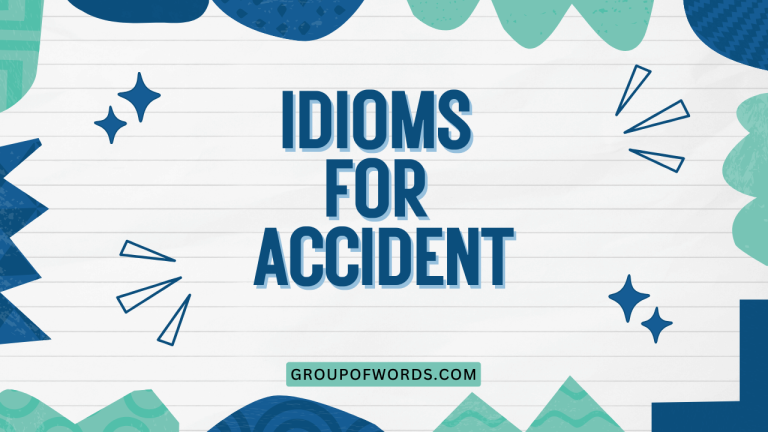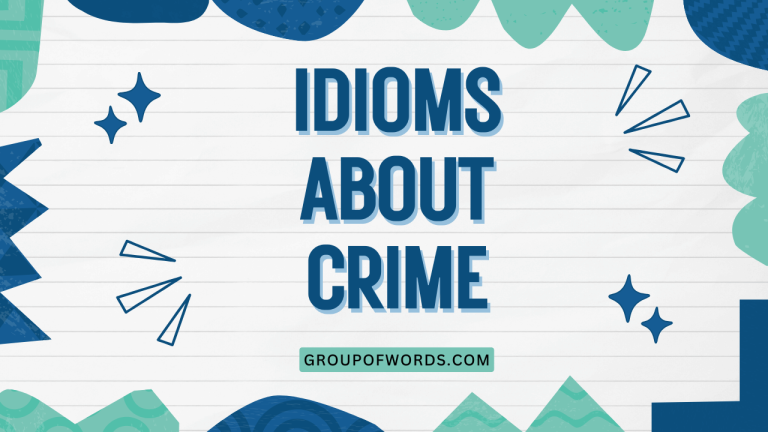Idioms for Smart Person: Expanding Your English Vocabulary
Idioms are a crucial part of the English language, adding color and depth to everyday conversations and written texts. Understanding idioms, especially those relating to intelligence and knowledge, can significantly enhance your comprehension and communication skills.
This article explores a variety of idioms used to describe a smart or intelligent person, providing definitions, examples, and practice exercises to help you master their usage.
Table of Contents
- Introduction
- Definition of Idioms for Smart Person
- Structural Breakdown of Idioms
- Types and Categories of Idioms for Smart Person
- Examples of Idioms for Smart Person
- Usage Rules for Idioms
- Common Mistakes with Idioms
- Practice Exercises
- Advanced Topics in Idiom Usage
- FAQ: Frequently Asked Questions
- Conclusion
Introduction
Idioms are expressions whose meanings cannot be understood from the literal meanings of the individual words. They are a vital part of colloquial English and are used extensively in both formal and informal settings.
For English language learners, mastering idioms can be challenging but rewarding. This article focuses on idioms that describe a “smart person,” equipping you with the vocabulary to recognize and use these expressions effectively.
Understanding these idioms will not only improve your comprehension but also make your speech and writing more colorful and engaging. Whether you are a student, a professional, or simply an English enthusiast, this guide will help you navigate the fascinating world of English idioms.
Definition of Idioms for Smart Person
An idiom is a phrase or expression whose meaning is different from the literal meaning of its individual words. Idioms often carry cultural and historical context, making them unique to a particular language or region.
When we talk about “idioms for a smart person,” we are referring to phrases that describe someone as intelligent, knowledgeable, clever, or wise. These idioms can range from simple, everyday expressions to more complex and nuanced phrases that require a deeper understanding of the language.
These idioms are often used to convey admiration, respect, or sometimes even sarcasm, depending on the context.
The function of these idioms is to add color and depth to language, allowing speakers and writers to convey complex ideas in a concise and engaging manner. They are used in various contexts, including casual conversations, formal speeches, and written literature.
By understanding and using these idioms, you can communicate more effectively and demonstrate a strong command of the English language.
Structural Breakdown of Idioms
Idioms, by their very nature, defy strict grammatical rules. Their structure is often fixed, meaning that you cannot change the words or their order without altering the meaning or rendering the idiom nonsensical.
Understanding the structure of idioms involves recognizing that they function as single units of meaning, rather than as collections of individual words. Here’s a breakdown of common structural elements found in idioms:
- Phrasal Verbs: Many idioms are based on phrasal verbs, which consist of a verb and a preposition or adverb (e.g., catch on, figure out).
- Metaphorical Language: Idioms often use metaphors to convey their meaning, comparing one thing to another to illustrate a point (e.g., a sharp cookie).
- Fixed Expressions: Idioms are generally fixed expressions, meaning the words and their order cannot be changed. Altering the structure usually destroys the meaning (e.g., you can’t say “a cookie sharp” instead of “a sharp cookie”).
- Figurative Language: Idioms often rely on figurative language, using words or expressions in a non-literal way to create a particular effect (e.g., brainy).
Understanding these structural elements can help you recognize and interpret idioms more effectively. While you cannot change the structure of an idiom, recognizing its components can aid in understanding its meaning and usage.
Types and Categories of Idioms for Smart Person
Idioms for describing a smart person can be categorized based on the specific nuance they convey. Some idioms emphasize intelligence, while others highlight cleverness, wisdom, or quick-wittedness.
Here are some common categories:
1. Intelligence and Knowledge
These idioms directly refer to a person’s intellect and knowledge base.
2. Cleverness and Quick-Wittedness
These idioms emphasize a person’s ability to think quickly and solve problems effectively.
3. Wisdom and Insight
These idioms highlight a person’s deep understanding and insightful perspective.
4. Academic Excellence
These idioms are often used in academic or educational settings to describe someone who excels in their studies.
5. Sarcastic or Ironic Idioms
These idioms are used ironically to describe someone who is not actually smart, often in a humorous or critical way.
Examples of Idioms for Smart Person
This section provides numerous examples of idioms used to describe a smart person, organized by the categories mentioned above. Each idiom is accompanied by a definition and example sentence to illustrate its usage.
1. Intelligence and Knowledge
This table provides examples of idioms that describe someone as intelligent or knowledgeable. Each idiom is defined, and an example sentence is provided to illustrate its usage in context.
| Idiom | Definition | Example Sentence |
|---|---|---|
| Brainy | Very intelligent; having a sharp mind. | She’s incredibly brainy and always gets top marks in her exams. |
| Bright | Intelligent and quick to learn. | He’s a bright student who easily grasps new concepts. |
| Sharp | Quick-witted and intelligent. | She has a sharp mind and can solve complex problems effortlessly. |
| Smart cookie | An intelligent or clever person. | He’s a smart cookie; he figured out the solution in no time. |
| On the ball | Alert, competent, and quick to understand things. | Our new project manager is really on the ball and has already improved our efficiency. |
| Knows his/her stuff | To be very knowledgeable about a particular subject. | When it comes to coding, he really knows his stuff. |
| Has a good head on his/her shoulders | To be intelligent and sensible. | She has a good head on her shoulders and always makes wise decisions. |
| Quick on the uptake | Able to understand things quickly. | He’s quick on the uptake and always understands the instructions immediately. |
| A whiz | Someone who is very skilled or clever at something. | She’s a whiz at mathematics and can solve complex equations in seconds. |
| A genius | A person with exceptional intellectual or creative power. | Everyone says that Einstein was a genius. |
| Book smart | Intelligent due to studying and academic learning. | He’s book smart, but lacks practical experience. |
| Street smart | Intelligent due to practical experience and common sense. | Growing up in the city, she became very street smart. |
| Well-read | Having read many books and possessing a wide range of knowledge. | He’s well-read and can discuss a variety of topics intelligently. |
| Erudite | Having or showing great knowledge or learning. | The professor was erudite and could answer any question the students asked. |
| Scholarly | Involving or relating to serious academic study. | His scholarly work has been recognized by universities worldwide. |
| Gifted | Having exceptional talent or natural ability. | She’s a gifted musician and started playing the piano at age four. |
| A walking encyclopedia | Someone who seems to know everything. | Ask him anything; he’s like a walking encyclopedia. |
| A bright spark | A clever and intelligent person. | She’s a bright spark in the team and always comes up with innovative ideas. |
| Has all his/her marbles | To be mentally sound and intelligent. | Don’t worry about him; he has all his marbles. |
| Not born yesterday | Not easily fooled; experienced and knowledgeable. | You can’t trick her; she wasn’t born yesterday. |
| Wise | Having or showing experience, knowledge, and good judgment. | The old man was wise from his many years of experience. |
| Astute | Having or showing an ability to accurately assess situations or people and turn this to one’s advantage. | He was an astute businessman, quickly seizing opportunities in the market. |
| Perceptive | Having or showing sensitive insight. | She is a perceptive judge of character, rarely misjudging people. |
2. Cleverness and Quick-Wittedness
This table showcases idioms that describe someone as clever or quick-witted. These idioms emphasize the ability to think on one’s feet and come up with smart solutions.
| Idiom | Definition | Example Sentence |
|---|---|---|
| Quick-witted | Able to think or respond quickly and intelligently. | Her quick-witted response saved the company from a PR disaster. |
| Sharp as a tack | Very intelligent and alert. | He’s as sharp as a tack and always understands the nuances of the situation. |
| On the spot | Able to react quickly and effectively to a situation. | She can come up with solutions on the spot. |
| Think on one’s feet | To adjust quickly to changes and make fast decisions. | In that job, you need to be able to think on your feet. |
| Whip-smart | Extremely intelligent and quick-thinking. | She’s whip-smart and always has a clever answer. |
| Have one’s wits about one | To be alert and able to think quickly. | You need to have your wits about you to succeed in this business. |
| A quick study | Someone who learns things quickly and easily. | He’s a quick study and picked up the new software in no time. |
| Nimble-minded | Having a quick and agile mind. | She’s nimble-minded and can solve complex problems with ease. |
| Clever clogs | (Informal) Someone who is annoyingly intelligent or tries to show off their intelligence. | He’s such a clever clogs, always trying to prove he’s the smartest person in the room. |
| Crafty | Skilled at deception to achieve one’s goals. | The crafty lawyer found a loophole in the contract. |
| Shrewd | Having or showing sharp powers of judgment; astute. | He was a shrewd investor, always knowing when to buy and sell. |
| Resourceful | Able to find quick and clever ways to overcome difficulties. | The team was resourceful in finding a solution to the problem. |
| Ingenious | Clever, original, and inventive | Her ingenious design won first prize in the competition. |
| Artful | Clever or skillful, especially in a cunning or crafty way. | He was an artful negotiator, always getting the best deal. |
| Adept | Very skilled or proficient at something. | She is adept at handling difficult situations. |
| Agile | Able to move quickly and easily; also, able to think quickly and intelligently. | He had an agile mind, quickly grasping complex concepts. |
| Brainstormer | A person who generates innovative ideas. | She’s a great brainstormer and always comes up with creative solutions. |
| A master strategist | Someone skilled in planning and executing complex strategies. | He’s a master strategist and always knows how to achieve his goals. |
| A problem solver | Someone who is good at finding solutions to problems. | She’s a natural problem solver and can always find a way out of a difficult situation. |
| On the ball | Aware of what is happening and quick to react. | The new assistant is really on the ball and has already made a big difference. |
3. Wisdom and Insight
This table includes idioms that describe someone as wise or insightful. These idioms emphasize a person’s deep understanding and good judgment.
| Idiom | Definition | Example Sentence |
|---|---|---|
| Sage | Profoundly wise. | The sage advice of my grandfather helped me through a difficult time. |
| Insightful | Having or showing a clear and deep understanding of a situation. | Her insightful analysis of the problem helped us find a solution. |
| Perceptive | Having or showing sensitive insight. | She is a perceptive judge of character. |
| Wise owl | Someone who is very wise and knowledgeable. | My grandmother is a wise owl and always gives the best advice. |
| Old head on young shoulders | A young person who thinks and acts like an older, more experienced person. | He’s an old head on young shoulders and always makes sensible decisions. |
| Knows what’s what | To be knowledgeable and experienced. | She knows what’s what and can handle any situation. |
| Has seen it all | To have experienced many things in life and gained wisdom from those experiences. | He has seen it all and can offer valuable insights. |
| A deep thinker | Someone who thinks seriously and profoundly about things. | She’s a deep thinker and always has interesting perspectives. |
| A visionary | A person with original ideas about what the future will or could be like. | He’s a visionary and has transformed the company with his innovative ideas. |
| A guru | An influential teacher or popular expert. | He’s a guru in the field of technology. |
| A mentor | An experienced and trusted advisor. | She’s been a mentor to many young professionals. |
| A guiding light | A person who provides inspiration and direction. | He’s been a guiding light in my career. |
| A clairvoyant | Having or exhibiting an ability to perceive events in the future or beyond normal sensory contact. | Some consider her to be a clairvoyant due to her accurate predictions. |
4. Academic Excellence
This table presents idioms often used in academic or educational contexts to describe someone who excels in their studies.
| Idiom | Definition | Example Sentence |
|---|---|---|
| Top of the class | The best student in a class. | She was always top of the class in every subject. |
| Straight-A student | A student who consistently gets excellent grades. | He’s a straight-A student and is always at the top of his class. |
| Acing every test | Getting a perfect score on every test. | She’s been acing every test this semester. |
| Honor student | A student who is recognized for high academic achievement. | He was an honor student throughout his college years. |
| Dean’s List | An academic award given to students who achieve high grades. | She made the Dean’s List every semester. |
| Valedictorian | The student with the highest academic rank who delivers the farewell speech at graduation. | He was chosen as the valedictorian for his graduating class. |
| Summa Cum Laude | The highest academic distinction, awarded to students who achieve exceptional grades. | She graduated Summa Cum Laude from Harvard. |
| Phi Beta Kappa | An academic honor society for students with high scholastic achievement. | He was inducted into Phi Beta Kappa in his junior year. |
| A scholar | A person who is highly educated or has an aptitude for study. | He’s a renowned scholar in the field of history. |
| A prodigy | A young person with exceptional qualities or abilities. | She’s a mathematical prodigy. |
5. Sarcastic or Ironic Idioms
This table provides idioms that are used sarcastically or ironically to describe someone who is not actually smart. These idioms often carry a humorous or critical tone.
| Idiom | Definition | Example Sentence |
|---|---|---|
| Not the sharpest tool in the shed | Not very intelligent. | He’s not the sharpest tool in the shed, but he’s a hard worker. |
| A few fries short of a Happy Meal | Not very intelligent; lacking common sense. | He seems to be a few fries short of a Happy Meal. |
| Not playing with a full deck | Not very intelligent or sane. | I think he’s not playing with a full deck. |
| One sandwich short of a picnic | Not very intelligent. | He’s one sandwich short of a picnic, if you ask me. |
| As thick as two short planks | Very stupid. | He’s as thick as two short planks. |
| Not the brightest bulb in the box | Not very intelligent. | She’s not the brightest bulb in the box. |
| Dim-witted | Stupid or unintelligent. | He’s a bit dim-witted, but he means well. |
| Dense | Slow to understand; stupid. | He’s a bit dense sometimes. |
| A knucklehead | A stupid or foolish person. | He’s such a knucklehead. |
| A blockhead | A stupid person. | Don’t be such a blockhead. |
Usage Rules for Idioms
Using idioms correctly requires understanding their specific meanings and contexts. Here are some key usage rules to keep in mind:
- Context Matters: The meaning of an idiom can change depending on the context in which it is used. Pay attention to the surrounding words and the overall tone of the conversation or text.
- Fixed Structure: Idioms generally have a fixed structure, meaning you cannot change the words or their order without altering the meaning.
- Cultural Sensitivity: Be aware that some idioms may be culturally specific and may not be understood or appreciated by people from different backgrounds.
- Formality: Some idioms are more formal than others. Choose idioms that are appropriate for the setting and audience.
- Overuse: Avoid overusing idioms, as this can make your speech or writing sound unnatural or forced.
Common Mistakes with Idioms
Here are some common mistakes that English language learners make when using idioms, along with correct examples:
| Incorrect | Correct | Explanation |
|---|---|---|
| She is very brain. | She is very brainy. | “Brainy” is the correct idiom, not just “brain.” |
| He is sharp like a tack. | He is as sharp as a tack. | The correct idiom is “as sharp as a tack.” |
| She has a good head on his shoulders. | She has a good head on her shoulders. | The possessive pronoun must match the subject’s gender. |
| He is very quick on the taking. | He is quick on the uptake. | The correct term is “uptake,” not “taking.” |
| She is a walking book. | She is a walking encyclopedia. | The correct idiom is “walking encyclopedia.” |
| He was not born yesterday morning. | He wasn’t born yesterday. | The idiom is simply “wasn’t born yesterday.” |
| She is as clever as two planks. | She’s as thick as two short planks. | The idiom is “as thick as two short planks,” used ironically. |
Practice Exercises
Test your understanding of idioms for smart people with the following exercises. Choose the correct idiom to complete each sentence.
Exercise 1: Fill in the Blanks
Complete the following sentences with the correct idiom from the list below:
Idiom List: brainy, on the ball, knows his stuff, quick on the uptake, not the sharpest tool in the shed, sharp as a tack, has a good head on her shoulders, wise owl, one sandwich short of a picnic, thinks on his feet
| Question | Answer |
|---|---|
| 1. She’s incredibly __________ and always gets top marks in her exams. | brainy |
| 2. Our new project manager is really __________ and has already improved our efficiency. | on the ball |
| 3. When it comes to coding, he really __________. | knows his stuff |
| 4. He’s __________ and always understands the instructions immediately. | quick on the uptake |
| 5. He’s __________, but he’s a hard worker. | not the sharpest tool in the shed |
| 6. She’s as __________ and always understands the nuances of the situation. | sharp as a tack |
| 7. She __________ and always makes wise decisions. | has a good head on her shoulders |
| 8. My grandmother is a __________ and always gives the best advice. | wise owl |
| 9. He seems to be __________. | one sandwich short of a picnic |
| 10. In that job, you need to be able to __________. | thinks on his feet |
Exercise 2: Multiple Choice
Choose the best idiom to replace the underlined words in each sentence.
| Question | Options | Answer |
|---|---|---|
| 1. She is a very intelligent student. | a) dense b) brainy c) dim-witted d) knucklehead | b) brainy |
| 2. He is very quick to understand things. | a) slow on the uptake b) quick on the uptake c) not playing with a full deck d) a few fries short of a Happy Meal | b) quick on the uptake |
| 3. She is very knowledgeable about math. | a) knows her stuff b) not the sharpest tool in the shed c) dim-witted d) dense | a) knows her stuff |
| 4. He makes smart decisions. | a) not the brightest bulb in the box b) has a good head on his shoulders c) a blockhead d) a knucklehead | b) has a good head on his shoulders |
| 5. She is very wise. | a) a walking encyclopedia b) a wise owl c) not playing with a full deck d) a few fries short of a Happy Meal | b) a wise owl |
| 6. He is not very intelligent. | a) quick on the uptake b) whip-smart c) a few fries short of a Happy Meal d) well-read | c) a few fries short of a Happy Meal |
| 7. She is very clever and alert. | a) sharp as a tack b) dense c) dim-witted d) a blockhead | a) sharp as a tack |
| 8. He is able to react quickly. | a) thinks on his feet b) not the sharpest tool in the shed c) dense d) dim-witted | a) thinks on his feet |
| 9. She is always aware of what’s happening. | a) a few fries short of a Happy Meal b) on the ball c) as thick as two short planks d) not playing with a full deck | b) on the ball |
| 10. He is very smart but lacks experience. | a) street smart b) book smart c) whip-smart d) wise owl | b) book smart |
Advanced Topics in Idiom Usage
For advanced learners, understanding the nuances of idiom usage can further enhance their English proficiency. This includes recognizing the historical and cultural contexts of idioms, understanding how idioms can be used creatively in literature and rhetoric, and appreciating the variations in idiom usage across different dialects and regions.
Additionally, advanced learners can explore the use of idioms in humor and satire, where idioms are often twisted or subverted to create comedic effects. They can also analyze how idioms are translated across languages and the challenges involved in finding equivalent expressions that capture the same meaning and nuance.
FAQ: Frequently Asked Questions
Here are some frequently asked questions about idioms for smart people:
- What is an idiom?
An idiom is a phrase or expression whose meaning cannot be understood from the literal meanings of its individual words. It’s a figure of speech that has a culturally understood meaning.
- Why is it important to learn idioms?
Learning idioms can significantly improve your understanding of spoken and written English. It also allows you to communicate more effectively and naturally, and understand cultural nuances.
- How can I learn idioms effectively?
Immerse yourself in English language content (books, movies, TV shows), practice using idioms in conversation, and keep a notebook of new idioms you encounter. Contextual learning is key.
- Are idioms the same in all English-speaking countries?
No, idioms can vary significantly between different English-speaking countries and regions. Be aware of these variations and use idioms that are appropriate for your audience.
- Can I change the words in an idiom?
Generally, no. Idioms have a fixed structure, and changing the words can alter the meaning or make the idiom nonsensical. There are exceptions in creative writing for effect, but it’s best to stick to the original form.
- How do I know when to use an idiom?
Consider the context, your audience, and the level of formality. Idioms are often appropriate in informal settings but may be less suitable for formal writing or presentations. When in doubt, err on the side of caution.
- What should I do if I don’t understand an idiom?
Ask for clarification! Don’t be afraid to ask someone to explain the meaning of an idiom you don’t understand. You can also look it up in a dictionary or online resource.
- Are there any resources that can help me learn idioms?
Yes, there are many dictionaries, websites, and apps dedicated to idioms. Some popular resources include the Oxford Idioms Dictionary, Merriam-Webster’s Idiom Dictionary, and various online idiom lists and quizzes.
Conclusion
Mastering idioms for describing a smart person is a valuable skill for English language learners. By understanding the definitions, usage rules, and common mistakes associated with these expressions, you can significantly enhance your communication skills and demonstrate a strong command of the English language.
Continue to practice using these idioms in various contexts to solidify your understanding and make your speech and writing more colorful and engaging. Remember to pay attention to context, cultural sensitivity, and formality when using idioms, and don’t be afraid to ask for clarification when needed.
With consistent effort and practice, you can become proficient in using idioms and express yourself with greater confidence and fluency.






